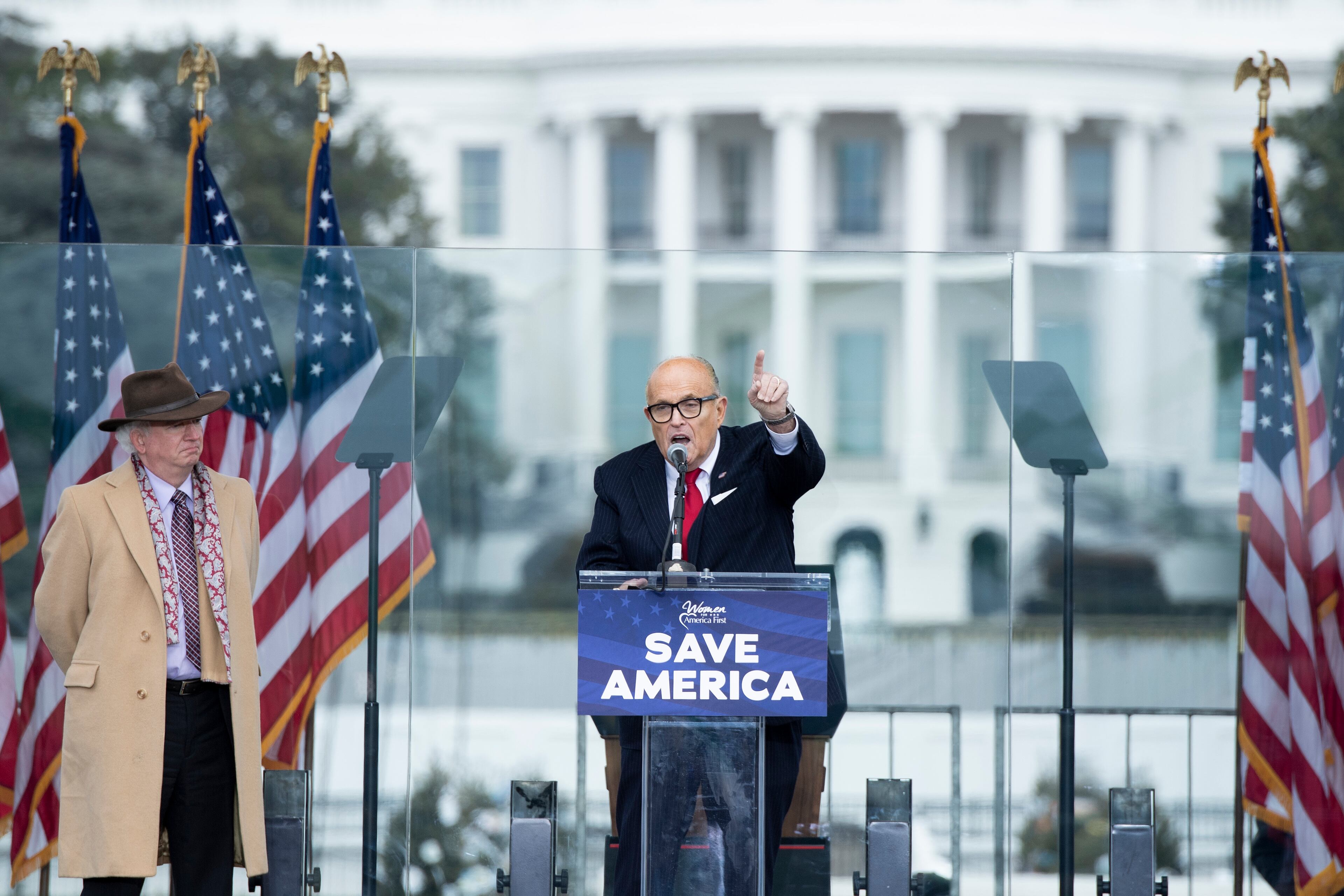Judge recommends disbarring attorney who aided Trump

Another defendant in the Georgia election interference case may lose his license to practice law for aiding Donald Trump’s efforts to overturn the 2020 presidential election.
John Eastman devised questionable legal theories that Trump used to try to convince state legislators and Vice President Mike Pence to reject Democrat Joe Biden’s victory. On Wednesday a California judge recommended that Eastman be barred from practicing law in the state, citing his efforts to overturn the election in Georgia and other swing states Biden won. The California Supreme Court will review the ruling, but Eastman’s license will become inactive in three days, according to Wednesday’s order.
Judge Yvette Roland of the State Bar Court cited Eastman’s “multiple patently false and misleading statements in court filings, in public remarks heard by countless Americans and to others regarding the conduct of the 2020 presidential election and Vice President Pence’s authority to refuse to count or delay counting properly certified slates of electoral votes on January 6, 2021.”
Eastman’s lawyers issued a statement late Wednesday defending his actions.
“The process undertaken by Dr. Eastman in 2020 is the same process taken by lawyers every day and everywhere – indeed, that is the essence of what lawyers do,” the statement said. “They are ethically bound to be zealous advocates for their clients – a duty Dr. Eastman holds inviolate. To the extent today’s decision curtails that principle, we are confident the Review Court will swiftly provide a remedy.”
Christine P. Sun, a senior vice president at the States United Democracy Center, which filed an ethics complaint against Eastman, hailed the ruling.
“This decision sends an unmistakable message: No one is above the law—not presidents, and not their lawyers,” Sun said.
Eastman’s legal odyssey is not over. He is one of 19 people charged last year for their roles in an alleged scheme to steal the election in Georgia. He is also an unindicted co-conspirator in the federal election case against Trump.
Eastman is one of dozens of lawyers who have faced ethics complaints for aiding Trump’s effort to remain in the White House despite losing to Biden. Among them are seven of the original Georgia defendants.
New York has suspended the law license of Rudy Giuliani, and the Washington, D.C. bar is seeking his disbarment. Federal courts have upheld sanctions against attorney Sidney Powell, who pleaded guilty to six misdemeanor counts in the Georgia election case last fall.
Former Justice Department official Jeffrey Clark faces disbarment proceedings this week. Georgia defendant Ray Smith also faces a pending ethics complaint – as do Kenneth Chesebro and Jenna Ellis, who both pleaded guilty to charges in the case last fall.
Eastman helped develop a legal rationale for Trump’s campaign to challenge Biden’s victory.
In December 2020 he told Georgia legislators that allegations of voting fraud justified a special session of the General Assembly to investigate the claims and name Trump the winner. In fact, numerous judges rejected Georgia fraud claims, and investigators found no evidence of fraud that could have affected the outcome of the election.
Eastman also argued that Pence had the authority to reject Biden electors when Congress convened for the official count on Jan. 6, 2021. Pence and numerous legal scholars disavowed such arguments. But Trump and Eastman lobbied the vice president, and both spoke at the Jan. 6 rally that devolved into an attack on the U.S. Capitol that disrupted the peaceful transfer of power.
Last year the State Bar of California filed 11 charges against Eastman. Among other things, the bar said Eastman made baseless legal arguments and made false statements about election fraud that helped provoked the attack.
“He demonstrably contributed to the gravest threat to our democracy in modern history – the violent attack on the Capitol on Jan. 6, 2021,” the bar said in a recent court filing. “Respondent’s repeated unlawful conduct, the harm it caused and its predictable continued injury to our democracy require his disbarment.”
In court documents and in a trial last fall, Eastman argued his legal arguments were sound and his concerns about voting fraud were well-founded. He described the complaint against him as an Orwellian attempt to stifle legitimate concerns about fraud.

“[T]he government has spoken, and if you disagree, then you must be lying,” his attorney argued in a recent court filing. “Two plus two equals five, after all, and if the government says so, you must not only repeat the lie, but you must come to believe it as well.”
Roland upheld 10 of the 11 charges against Eastman and rejected his argument that the discipline was politically motivated.
“While attorneys have a duty to advocate zealously for their clients, they must do so within the bounds of ethical and legal constraints,” the judge wrote. “Eastman’s actions transgressed those ethical limits by advocating, participating in and pursuing a strategy to challenge the results of the 2020 presidential election that lacked evidentiary or legal support.
“Vigorous advocacy does not absolve Eastman of his professional responsibilities around honesty and upholding the rule of law,” Roland wrote.
Eastman had strong conservative bona fides long before he came into Trump’s orbit. He was a clerk for U.S. Supreme Court Justice Clarence Thomas and a longtime member of the Federalist Society. He is also the former dean of the law school at Chapman University in Orange County, Calif. but parted ways with the school after his role in the Jan. 6 attacks came under scrutiny.
He had originally faced nine felony counts in the Georgia election case. However, Fulton County Superior Court Judge Scott McAfee recently dismissed six counts against various defendants, including one against Eastman, ruling that the charges lacked sufficient detail. Prosecutors have not said whether they will refile the charges with additional details.



